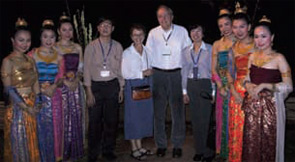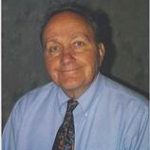He did his residency and initial rheumatology fellowship at the Wadsworth VA Hospital in Los Angeles and the University of California, Los Angeles Medical Center. While stationed at Travis Air Force Base from 1963–1965, Dr. Schumacher established a relationship with Ephraim Engelman, MD, chief of rheumatology at the University of California, San Francisco (UCSF), who, he says, “was willing to let a ‘young punk’ with just one year of fellowship” drive from the Air Force Base just outside Fairfield, Calif., to the UCSF lab to continue his investigations into the arthritis-complicating hemochromatosis that had been the subject of one of his first papers.
Following his military service, it was on to another fellowship in rheumatology at Robert Breck Brigham Hospital and Harvard Medical School, both in Boston, where he learned electron microscopy from basic scientist Guido Majno, MD. And that, says Dr. Schumacher, was a major “A-ha!” scientific moment for him. He had latched onto the idea of investigating the pathology of the joint earlier while at the Wadsworth VA with Carl Pearson, MD, who was “looking mostly at muscle, but who was very influential for me,” he says. But it was in Boston that Dr. Schumacher realized he could utilize the then-new technology of the electron microscope and “look through it at very early arthritis, to try to find out its causes.”
Many of Dr. Schumacher’s research papers emanated from his exploration of the synovium and the synovial fluid in rheumatoid arthritis. But then, as is often the case with scientific discovery, he began discovering other things besides the still-elusive causes of rheumatoid arthritis—such as nucleic acids of Chlamydia and other bacteria in the synovium despite negative cultures in reactive arthritis.4 Dr. Schumacher relentlessly pursued the causes of a host of other diseases throughout his career, including osteoarthritis and other metabolic arthropopathies and endocrinopathies.

A Beehive of Activity
The bulk of that research took place at Penn, Dr. Schumacher’s alma mater, after he joined the faculty in 1967 under Joe Hollander, MD, and was named chief of the arthritis section at the VA Medical Center, a post he held for more than 30 years. He built an effective, stable research team with one technician-collaborator, Gilda Clayburne, MLT, who has now worked with him for 40 years. His faculty and administrative appointments also attest to his multiple talents. He has held professorships in the School of Veterinary Medicine (developing a model for gout in dogs’ knees and studying a spontaneous rheumatoid-like arthritis in dogs); in the department of orthopedic surgery (studying factors involved in joint implant loosening); and was a visiting scholar at National Institute of Arthritis, Musculoskeletal, and Skin Disease from 1994–1999, where he did synovial biopsies and established an early arthritis cohort.

